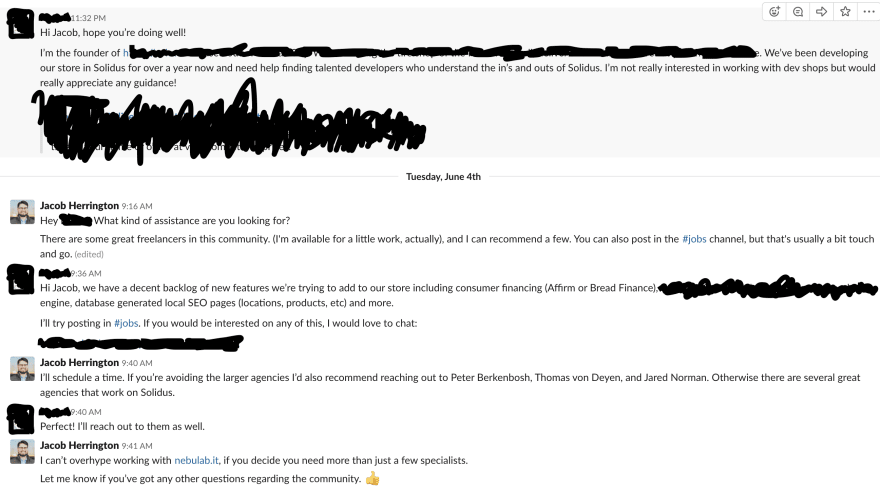Cover Image: Eyeglasses in Front of Laptop Computer by Christina Morillo
I give a lot of career advice. I mentor interns, juniors, and random people on the internet, usually drawing on my own experience or the stories shared on devpath.fm.
This particular set of advice comes from my own experience, I don't advise that everyone takes the same path I did (because it wasn't sustainable), but I do currently have evidence that I could spin up a quarter-to-half million-dollar consulting business if I felt inclined, which is pretty nice to know.
The story starts back in June of 2018 with a Pull Request on GitHub that changed a few lines of markup:
@jacobeubanks and I made this Pull Request to Solidus.
It was modest, but for us, it felt like an achievement. We were both pretty new to Open Source, and neither of us had really contributed to a project that was actively being used like Solidus.
Getting that PR merged really struck a chord with me, so I started looking for other ways to help out around the project (which is hard on a 10-year-old codebase).
Before long, I had a handful of commits mostly around documentation and small UI bugs. I'd also gotten involved in the project's Slack channel and asked the maintainers how I could be most helpful.
I had some great opportunities to get involved because I was invited to weigh-in on the Solidus Stakeholders committee and also attended a community conference in Memphis.
Between the direction offered to me by one of the project's Core Team members, Alberto Vena, and the bugs I found on my own, I was able to get my name fairly well-known within the small community.
One thing leads to another and eventually, Alberto extends an invitation to the Solidus Core Team.
As an aside, here is my advice for contributing to an Open Source project when you're afraid of rejection or unsure of your own ability to contribute:
Do boring tasks. They have to be done, and no one rejects a pull request that fixes tests, documentation, UI bugs or improves CI configuration.
This allowed me to contribute even more. I could review PRs, troubleshoot and sort issues, share my thoughts more effectively in the community, and merge new improvements.
I would say, this was a six to eight-month time investment. But the experience alone was worth that investment. I benefitted by learning more about Rails, making new friends and connections, and building a small Open Source portfolio.
Fast-forward to June 2019. I receive an unsolicited DM from a founder working with Solidus:
With zero outbound marketing, I was able to sign a client that would pay me over $10,000 USD a month for less than 20 hours a week chiefly because I was on the Core Team of the project.
This kind of exposure is incredibly valuable. I'll be the first to tell you, I'm not the most experienced or qualified developer in the Solidus community (that'd be those other people I recommended), but this founder saw my name on Solidus.io, so they reached out to me.
Here is some advice for reproducing this kind of thing:
1. Contribute to Open Source
Besides being great for your technical skills, your people skills, and the developer community, it's also great for building your professional network and brand. Being an Open Source contributor on a handful of projects is a no-brainer.
2. Be vocal and useful
Put your name on things you care about (like I did with Solidus). Look for opportunities to help others, it is the right thing to do for the developer community and it also helps you expand your professional network. This is super-duper important.
3. Find projects with a direct correlation to paid work
This is a really good idea if you're looking to turn Open Source expertise into a paycheck. With Solidus, this is obvious; people use Solidus to build businesses. There are business connections for many, many Open Source projects, especially if you want to go the consulting route. Contributing to literally any framework or infrastructure tool is highly marketable to the people building businesses with those tools.
4. Be open to opportunities
I literally never ignore an email, DM, or phone call. Yes, I see a lot of annoying spam, but I also see stuff like this because people know I am someone to reach out to when you have questions. There are varying degrees of this, what I do is not sustainable after a certain critical mass, so find a system that works for you. Just be sure you're not making it difficult to get in touch with you.
5. Find a healthy balance
I chose to spin this work down after one month because I was doing this consulting while also helping to build a startup. It was not sustainable in any way, so I stepped away from an opportunity. You cannot be available for these kinds of opportunities if you aren't balancing your workload.
Regardless of whether or not you can emulate my path or if you have the same amount of privilege or luck that has put me in the position to capitalize on opportunities like this, there is one piece of advice in this article that I will swear by until I die:
Be useful on the internet.
I'm pretty sure Ben Orenstein told me this when we were recording for my podcast (still working on that episode), but it rings true and encompasses all 5 of the tips I just gave.
Ideally, this gives you some insight into how Open Source work can turn into a job offer or a business.
I'd love to hear about other experiences with this same kind of thing or advice for getting into Open Source in the comments 👇





















